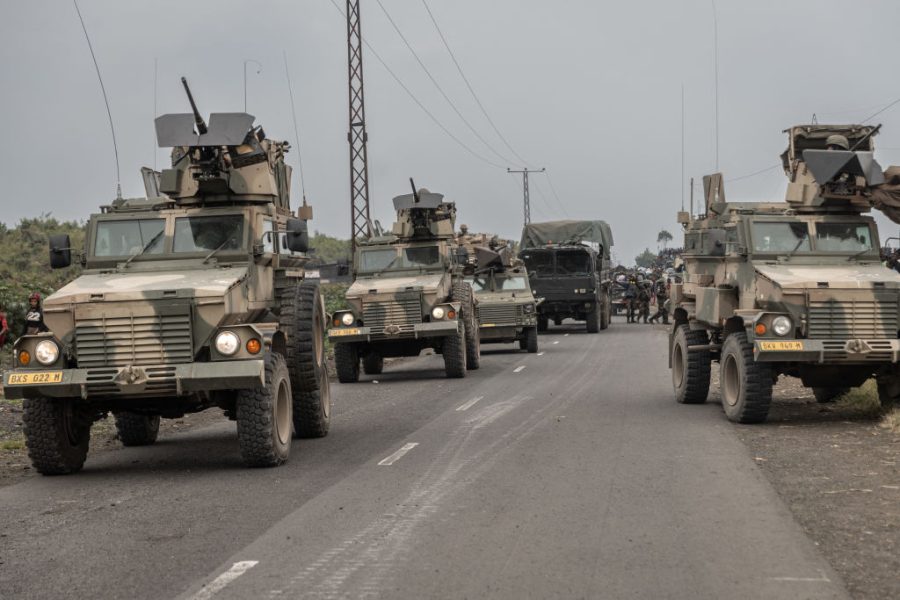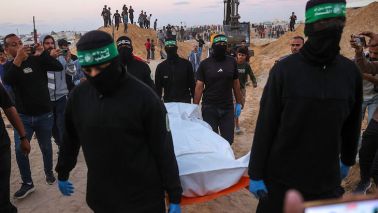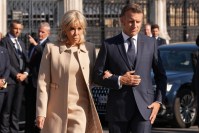Goma, a city of 1.5 million in Eastern Congo, has fallen to the M23 rebels, openly backed by Rwanda. Foreign governments are calling for the rebels to withdraw, and the UN Security Council has been holding crisis talks, but this is not the time to stop at diplomatic gestures: maximum pressure must be applied on Kigali immediately to shut this conflict down. Anything less risks repeating the horrors of the Second Congo War.
Between 1998 and 2003, over five million people died, countless families were shattered and entire communities were erased in the world’s deadliest conflict since the second world war. The Democratic Republic of Congo, a nation the size of Western Europe, became a battleground for nine countries, displacing millions and leaving a scar that has yet to heal. The fall of Goma is a warning of what’s to come if decisive action is not taken now.
Goma is a powder keg that could ignite the entire region
As rebel fighters entered Goma across yesterday and this morning, videos emerged showing residents cheering their arrival. At first glance, it seemed celebratory, but the truth is complex. Years of government neglect have eroded public trust in Kinshasa, and some see the rebels as saviours. Yet history tells us this is no victory. The last time Goma fell, it became the epicentre of a war that dragged much of Central Africa and beyond into chaos. The parallels are stark, and the consequences already catastrophic.
The fingerprints of Paul Kagame’s government are all over this rebellion. UN reports detail how Rwanda has supplied M23 with troops, weapons, and logistical support, including surface-to-air missiles. Rwanda denies involvement, but the evidence is undeniable. This is not a defensive operation to protect Tutsi populations in the Democratic Republic of Congo (DRC), as Kigali claims; it’s a calculated move to control Congo’s mineral wealth, including the rich deposits of tin, gold, and other critical resources concentrated in North Kivu. Meanwhile, Rwanda has been exporting increasingly large quantities of minerals, much of which is suspected to originate from conflict-affected areas in the DRC. This further highlights Kigali’s economic motivations for backing the M23. Rwanda’s aggression is blatant, deliberate, and must be stopped immediately.
Congo’s Foreign Minister Thérèse Kayikwamba Wagner made a plea yesterday to the UN Security Council: ‘This is not just an attack on Congo; it is an attack on Africa and humanity itself.’ Her words are a reminder of the stakes. Goma is a powder keg that could ignite the entire region.
The humanitarian toll of the conflict is already staggering. Over 6 million people are displaced in Congo, with nearly 400,000 forced to flee this year alone. Camps are overflowing, and basic resources are scarce. Women and children bear the brunt of this crisis, with reports of starvation and disease spreading rapidly. The UN peacekeeping mission in Congo, MONUSCO, has been paralysed, unable to stem the tide of violence or provide adequate protection to civilians. Peacekeepers themselves have described their situation as dire, with some stating they are effectively ‘trapped’, unable to operate freely amidst escalating violence. As Wagner warned, ‘Every hesitation condemns innocent people to the unspeakable.’
The Security Council and governments around the world have made the right noises about the situation in Goma, but ‘concern’ and ‘condemnation’ are not enough. The UK, for example, has expressed deep concern about the situation in Goma. The British government has issued security alerts advising against all travel to the city and urged nationals to leave. At the UN Security Council, British representatives condemned the M23’s declaration to take Goma and highlighted the dire humanitarian consequences. They called for an immediate halt to M23 advances and criticised attacks on UN peacekeepers, which they noted may constitute war crimes.
While these statements show awareness, the UK’s diplomatic approach falls far short of the decisive action needed to prevent escalation. The lessons of 2012, when aid suspensions successfully forced Rwanda to back down, demonstrate that more forceful measures are possible – and urgently necessary. The time for polite calls and empty resolutions has passed.
We have made this mistake too many times before. During the Second Congo War, the international community dithered while millions died. Once again, Western nations have the tools to stop this escalation. Aid constitutes a third of Rwanda’s budget, and donors have used this leverage before. In 2012, when Rwanda last supported the M23, aid suspensions forced Kagame to back down. Within months, the rebellion collapsed. Yet today, Western powers would appear to be hesitating. The European Union, while also condemning Rwanda’s actions, continues to fund its military ventures abroad, particularly in Mozambique. And Kagame’s PR machine works overtime, branding Rwanda as a beacon of progress while profiting from Congo’s misery. These hypocrisies are glaring and unacceptable.
Congo’s call for action is simple: act decisively. The international community must impose sanctions on Rwanda. Western nations must suspend aid to Kigali until it ceases its aggression. Words of condemnation are not enough; only concrete action will prevent this crisis from spiralling out of control.
Beyond immediate pressure on Rwanda, the world must recognise the broader stakes. Central Africa and the Great Lakes region cannot afford another prolonged conflict. Uganda, Burundi, and Tanzania are all vulnerable to destabilisation if the violence spreads. Refugee flows will overwhelm neighbouring countries, and the economic toll will ripple far beyond Africa.
The fall of Goma is not just a Congolese tragedy; it’s a global failure. Rwanda’s aggression threatens to plunge the region into chaos, yet the international community’s response remains alarmingly timid. The lessons of the last Congolese war are clear: inaction leads to catastrophe. We must stop pretending that polite diplomacy and symbolic gestures will suffice. Governments must act, leveraging aid and diplomacy to stop Kagame’s aggression in its tracks. The UN must enforce accountability, or its credibility will be irreparably damaged. History is watching, and the stakes could not be higher.








Comments